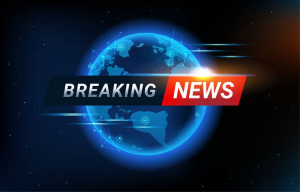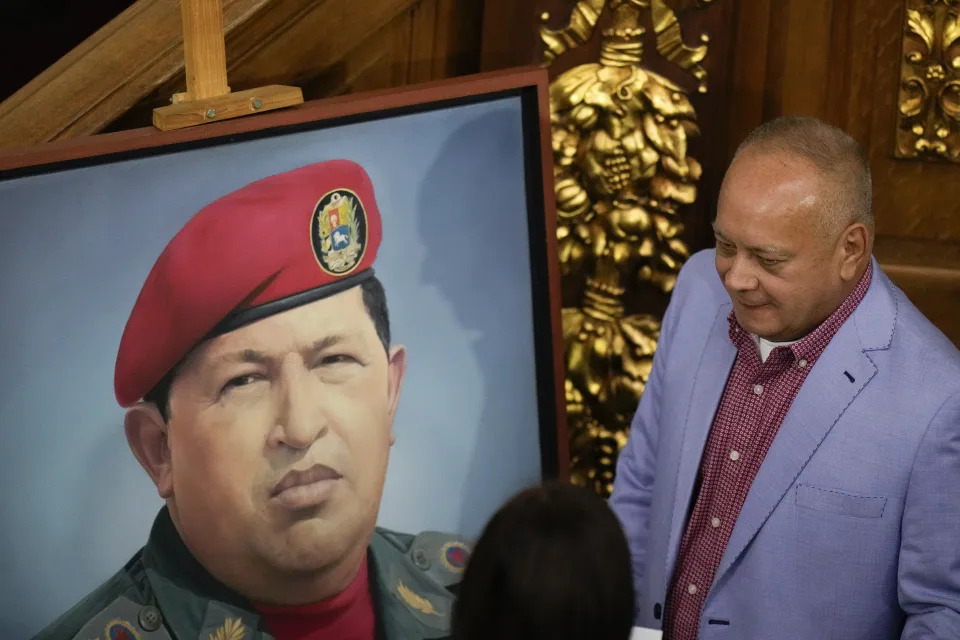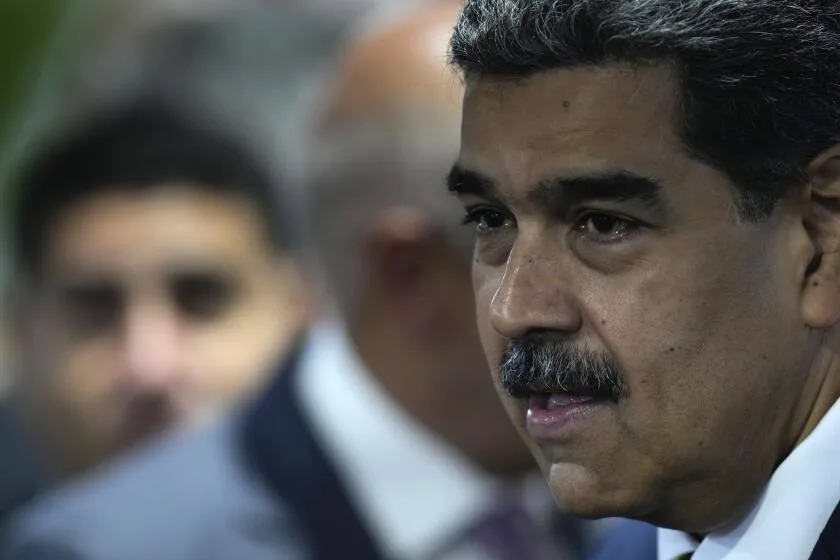Mexico’s excuses for inviting Putin and Maduro for inauguration are ridiculous

Mexico’s invitation to autocrats Vladimir Putin of Russia and Nicolás Maduro of Venezuela for President-elect Claudia Sheinbaum’s Oct. 1 inauguration is far from a routine diplomatic custom, as the Mexican government claims. It is an open endorsement of two of the world’s most brutal dictators.
The news of Mexico’s invitation to Putin was first reported by Russian media last week. The Izvestia newspaper quoted an official at Mexico’s Embassy in Moscow as saying that the “invitation to take part in the inauguration of President Sheinbaum was sent to President Putin.” It added that the Russian president would decide whether to attend or send a high-ranking official in his place.
It was a shocking revelation, because Putin has a warrant for his arrest from the International Criminal Court (ICC) for war crimes, including the illegal deportation of hundreds of Ukrainian children to Russia after his 2022 invasion of Ukraine.
International law experts agree that Mexico, as a member of the ICC, would have to arrest Putin if he set foot in its territory. But Mexico’s leftist populist President Andres Manuel Lopez Obrador has said that Mexico “cannot do that,” and that “it wouldn’t be proper” for his country to arrest the Russian leader if he accepts the invitation.
Sheinbaum later tried to downplay the invitations to Putin and Maduro, saying that it is customary for Mexico to invite all heads of state of countries with which Mexico has diplomatic relations to its presidents’ inaugural ceremonies. Sheinbaum’s designated foreign minister, Juan Ramón de la Fuente, said 208 heads of state have been invited to her swearing in ceremony, as part of a “protocol practice” for such occasions.
But these official explanations have more holes in them than a Swiss cheese.
It’s not true that Mexico has invited all countries with which it has diplomatic ties to Sheinbaum’s inauguration. Lopez Obrador admitted that he has not invited Peru and Ecuador to the event because of “differences” with the two countries’ governments.
While Mexico recently broke relations with Ecuador over Ecuador’s arrest of a former Ecuadoran vice-president accused of corruption who had taken refuge at the Mexican embassy in Quito, the Mexican government continues to have diplomatic relations with Peru.
Lopez Obrador has accused Peru’s Dina Boluarte of being an illegitimate president, claiming that Peru’s former extreme-left president, Pedro Castillo, was illegally overthrown. In fact, Castillo was constitutionally ousted after he announced the closing of Congress in what amounted to a coup to grab absolute powers.
It’s ironic that Mexico is now inviting Maduro, who brazenly stole the July 28 elections, while at the same time not inviting the legitimate president of Peru.
In addition, Mexico’s claim that inviting all heads of state is a customary practice by Mexico’s governments is only partially true.
It’s true in normal times, but these are not normal times. When you have Russia invading a neighboring country, or Maduro committing the biggest documented electoral fraud in recent Latin American history, you’re talking about entirely abnormal situations.
Mexico’s former foreign minister Jorge Castañeda told me that when many Latin American countries transitioned to democracies in the 1990s, it became a common practice for Latin American presidents to invite all of their counterparts in the region to their inaugural ceremonies. But with the current trend of democracies becoming authoritarian regimes, that norm no longer makes sense, he added.
“If Maduro goes to Mexico, it would amount to a blank Mexican validation of Venezuela’s electoral fraud,” Castañeda told me.
My bet is that Putin will not attend Sheinbaum’s inaugural ceremony — it’s too big a risk — but that Maduro will. Unlike Putin, Maduro is under investigation but has not yet been convicted by the ICC, and has the precedent of already having attended Lopez Obrador’s 2018 inauguration.
The Venezuelan dictator is craving for international legitimacy after his latest electoral fraud, and would be more than happy to appear in the picture alongside democratically-elected Latin American presidents. By allowing him to do that, Mexico will become an accomplice of one of the biggest electoral frauds in Latin American history.
AfriPrime App link: FREE to download...
https://www.amazon.com/Africircle-AfriPrime/dp/B0D2M3F2JT
UN expert panel sent to Venezuela blasts lack of transparency in presidential elections
A panel of experts from the United Nations said Venezuela's recent presidential elections lacked “basic transparency and integrity,” adding an important voice to those who have cast doubt on President Nicolás Maduro's claim he won the contest.
A four-member team sent by U.N. Secretary General António Guterres was in Caracas for over a month in the run up to the July 28 election, one of the few independent outside observers invited by Maduro's government.
While the U.N. group praised the logistic organization of the voting, it harshly criticized the National Electoral Council, or CNE, for flouting local rules and announcing Maduro the winner without tabulated results from each of the 30,000 polling booths nationwide, something it said “had no precedent in contemporary democratic elections.”
“This had a negative impact on confidence in the outcome announced by the CNE among a large part of the Venezuelan electorate,” the U.N. experts said in a statement late Tuesday.
The U.N. statement follows criticism by another invited observer, the Atlanta-based Carter Center, which said it could not verify the CNE's results. Venezuela's foreign minister has blasted the Carter Center, accusing it of lying and servings as a tool of U.S. “imperialism.”
While the U.N. team stopped short of validating claims by the opposition that its candidate, former diplomat Edmundo González, trounced Maduro by a more than 2-to-1 margin, it said that the voting records the anti-Maduro coalition published online appeared to exhibit all of the original security features.
“This suggests a key transparency safeguard may be available, as intended, with respect to any officially released results,” the experts added, noting that electoral authorities failed to meet with the group prior to the mission's departure from Venezuela five days after voting.
Since the election, security forces have arrested more than 2,000 people for demonstrating against Maduro or casting doubt on his claims that he won a third term.
Separately on Tuesday, the U.N.'s top human rights official expressed concern over the arbitrary detentions and “disproportionate use of force” in Venezuela as part of the crackdown.
“It is especially troubling that so many people are being detained, accused or charged either with incitement to hatred or under counterterrorism legislation," U.N. High Commissioner for Human Rights Volker Türk said in a statement. “Criminal law must never be used to limit unduly the rights to freedom of expression, peaceful assembly and association.”
Türk's comments come as Venezuela's opposition gears up for a demonstration Saturday that it hopes will increase pressure on Maduro to recognize defeat and negotiate a political transition.
“If Maduro makes a realistic evaluation of his options, he'll understand that digging in is not sustainable,” opposition leader María Corina Machado told journalists Tuesday.
Machado, who anointed previously unknown retired diplomat Edmundo González as her stand-in once she was banned from running in the presidential campaign, spoke to journalists at a virtual press conference from an undisclosed location due to safety concerns.
In her comments, she tried to temper expectations for a quick resolution of the political crisis.
“Nobody knows how long it will take, but without a doubt there are painful days that await us,” Machado said.
The U.N. human rights office said that in most of the cases it has documented, detainees haven't been allowed to appoint lawyers of their choice or have contact with their families. “Some of these cases would amount to enforced disappearances,” it said.
Türk called for "the immediate release of everyone who has been arbitrarily detained, and for fair trial guarantees for all detainees.” He added that “the disproportionate use of force by law enforcement officials and the attacks on demonstrators by armed individuals supporting the government, some resulting in deaths, must not be repeated.”
Türk also noted there have been reports of violence against public officials and public buildings by some demonstrators and said violence is never the answer.
On Monday, International Criminal Court prosecutors said they are “actively monitoring” events in Venezuela.
AfriPrime App link: FREE to download...
https://www.amazon.com/Africircle-AfriPrime/dp/B0D2M3F2JT
How do you solve a problem like Maduro? U.S. treads fine line on Venezuela
Previous efforts to oust Venezuelan President Nicolás Maduro have failed. Now U.S. officials hope to try an untested tack, relying on three Latin powerhouses that are friendly to both Caracas and Washington: Brazil, Colombia and Mexico.
The Biden administration is treading a thin line as it attempts to usher Venezuela’s dictator out of office without falling into the costly traps that vexed previous U.S. governments and angered Latin American allies.
After a July 28 presidential election riddled with fraud, both Venezuelan leader Nicolás Maduro and opposition candidate Edmundo González Urrutia claimed victory.
The U.S. sided with González and declared him the winner — but stopped short of actually recognizing him as president-elect. U.S. diplomats cited surveys of election ballots conducted by both the opposition and independent observers that gave González a 2-to-1 margin of victory.
Memories are fresh of the Trump administration’s efforts to oust Maduro, including harsh sanctions and arrest warrants. After an attempted Venezuelan coup in 2019, the Trump administration embraced an alternative president, Juan Guaidó, who led what became a government-in-exile.
Nothing budged Maduro, a former bus driver and socialist who took office after the 2013 death of Latin American leftist Hugo Chavez.
Now U.S. officials hope to try an untested tack while relying on the negotiating acumen of three Latin powerhouses that are friendly to both Caracas and Washington: Brazil, Colombia and Mexico. But they and other regional leaders have so far proved timid in their willingness to apply pressure to Maduro.
Presidents Luiz Inácio Lula da Silva of Brazil, Gustavo Petro of Colombia and Andrés Manuel López Obrador of Mexico, all left-leaning politicians, have urged Maduro to release a complete ballot count — something the Venezuelan government has still refused to do two weeks after voting ended. None of the other leaders, however, has publicly declared him the loser.
The Organization of American States, the region's largest multilateral organization, failed to muster majority approval of a mildly worded call for transparency.
"We would hope to see all parties take the steps that we have done," State Department spokesman Matthew Miller said, referring to the U.S. declaration that Maduro lost. However, he added, fuller recognition of González "is not a step that we are taking" now.
At stake as Maduro clings to power are further political and economic chaos and international isolation. He has launched a deadly crackdown on protesters, with more than two dozen killed and at least 2,000 arrested, including opposition politicians and journalists.
Once South America's wealthiest country, Venezuela saw around 6 million of its citizens flee as refugees, with another wave possible in the coming months. Many have reached the U.S., fueling an intense and divisive debate here over immigration.
“It was extremely important for us to come out on the record: The most critical thing is for the results to be respected, and we are working with allies to make sure that is the case,” a senior Biden administration official who works on the Venezuela issue said in an interview. The official was granted anonymity to discuss internal policy deliberations.
“The decision [to not accept a Maduro victory] is already a major form of diplomatic pressure,” the official said.
Maduro had agreed to hold the July election after months of negotiations involving regional officials and, unusually, the Persian Gulf state of Qatar, an OPEC partner of oil-rich Venezuela. U.S. officials were offering Maduro numerous benefits if he agreed to step down after losing, according to sources in the U.S. and Venezuela. Qatar has continued to participate in efforts to get Maduro to release election results, the White House said Monday.
The incentives included lifting criminal indictments and offering Maduro safe passage to a third country. (A State Department spokesman said Monday that such offers of amnesty have not been repeated since the election.)
The Venezuelan strongman was apparently worried that while Washington could drop its charges against him, the U.S. government was in no position to stop an investigation by the International Criminal Court into widespread human rights abuses attributed to the Maduro government.
Maduro apparently thought he could use the election to cement his legitimacy, the senior administration official said, after a decade of ruling with an iron fist, crushing dissent and stacking the courts, legislature and other major institutions with loyalists.
Ahead of the election, he frequently warned crowds that if he did not emerge the winner, Venezuelans faced a "bloodbath" and civil war.
The ways in which the Biden administration approach to Maduro departed from that of the Trump era include emphasizing incentives over punishment — more carrots than sticks, as several diplomats put it.
Following a flawed election in 2019, the Trump administration swiftly recognized Juan Guaidó, a little-known opposition politician who declared himself "interim president." Guaidó was seen as legitimate enough because he headed the National Assembly, at the time one of Venezuela's last remaining democratic institutions.
It was never clear how much domestic support he had, however, and many of the people who made up his shadow government resided in Washington. By the end of 2022, the Venezuelan opposition removed Guaidó, who today is believed to be residing in exile in Florida.
In addition to indicting Maduro on drug-trafficking and other charges, then-President Trump imposed harsh sanctions that targeted the Venezuelan economy, including its once-robust petroleum industry, in what was called a "maximum pressure campaign."
Diplomatic ties between the two countries were essentially severed in 2019.
But, starting in 2022, President Biden began to thaw the diplomatic freeze by secretly dispatching a team of emissaries to Caracas, where they launched talks that eventually led to prisoner swaps that freed more than a dozen Americans detained by Venezuela, including several executives from Houston-based Citgo Petroleum Corp.
Last year, Biden eased a number of sanctions on Venezuela's oil, gas and gold sectors in exchange for Maduro's commitment to negotiate with the Venezuelan opposition to hold fair elections.
That set the stage for the July vote, with an opposition more unified than ever, fighting an electoral battle at home rather than in Washington, and, according to polls, with a hefty lead over Maduro.
But now U.S. officials are forced to reassess their strategy, and they will have to maneuver carefully. Restoring the tougher sanctions could backfire, by driving Maduro further from any negotiations while alienating the Latin American countries that are attempting to pressure him but also don't want to be seen as doing Washington's bidding.
The administration "has to keep the allies on board," said Ryan Berg, who heads the Americas program at the Center for Strategic and International Studies, a think tank in Washington.
"They have to avoid giving [the presidents of Brazil, Colombia and Mexico] reason to care more about what the U.S. government is doing to Maduro than what Maduro did in stealing this election in such a brazen manner," he said.
On Friday, Panama's president, José Raúl Mulino, stepped in to offer a solution, saying he would facilitate Maduro's safe passage through Panama to a third country so that he could leave office peacefully.
Maduro responded with disdain and a derogatory term for the U.S. officials he suspected were behind the offer. After warning those who "mess with Venezuela,'' Maduro said the president of Panama was "getting carried away by the gringos."
AfriPrime App link: FREE to download...
- Questions and Answers
- Opinion
- Story/Motivational/Inspiring
- Technology
- Art
- Causes
- Crafts
- Dance
- Drinks
- Film/Movie
- Fitness
- Food
- Spiele
- Gardening
- Health
- Home
- Literature
- Music
- Networking
- Other
- Party
- Religion
- Shopping
- Sports
- Theater
- Wellness
- News
- Culture
- War machines and policy




